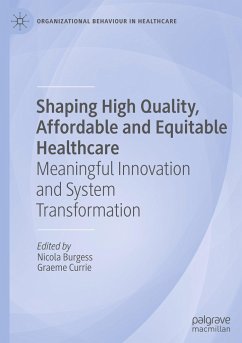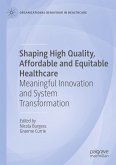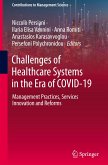Shaping High Quality, Affordable and Equitable Healthcare
Meaningful Innovation and System Transformation
Herausgegeben:Burgess, Nicola; Currie, Graeme
Shaping High Quality, Affordable and Equitable Healthcare
Meaningful Innovation and System Transformation
Herausgegeben:Burgess, Nicola; Currie, Graeme
- Gebundenes Buch
- Merkliste
- Auf die Merkliste
- Bewerten Bewerten
- Teilen
- Produkt teilen
- Produkterinnerung
- Produkterinnerung
Healthcare systems around the world are struggling under intense pressure. Ageing populations, declining workforce, funding restraints and spending cuts have combined to produce a challenging environment to deliver a service that is fundamental to the lives of many. This book defines sustainable healthcare as an integrated system, where stakeholders work together to deliver high quality, safe patient care at the lowest possible cost and with a focus on outcomes that patients value. Using this definition as a guide, this book brings together an extensive body of knowledge from an elite group of…mehr
Andere Kunden interessierten sich auch für
![Shaping High Quality, Affordable and Equitable Healthcare Shaping High Quality, Affordable and Equitable Healthcare]() Shaping High Quality, Affordable and Equitable Healthcare129,99 €
Shaping High Quality, Affordable and Equitable Healthcare129,99 €![Managing Healthcare Organisations in Challenging Policy Contexts Managing Healthcare Organisations in Challenging Policy Contexts]() Managing Healthcare Organisations in Challenging Policy Contexts121,99 €
Managing Healthcare Organisations in Challenging Policy Contexts121,99 €![User Innovation in Healthcare User Innovation in Healthcare]() Francesco SchiavoneUser Innovation in Healthcare49,99 €
Francesco SchiavoneUser Innovation in Healthcare49,99 €![Managing Healthcare Organisations in Challenging Policy Contexts Managing Healthcare Organisations in Challenging Policy Contexts]() Managing Healthcare Organisations in Challenging Policy Contexts121,99 €
Managing Healthcare Organisations in Challenging Policy Contexts121,99 €![Challenges of Healthcare Systems in the Era of COVID-19 Challenges of Healthcare Systems in the Era of COVID-19]() Challenges of Healthcare Systems in the Era of COVID-19113,99 €
Challenges of Healthcare Systems in the Era of COVID-19113,99 €![Patient Engagement Patient Engagement]() Patient Engagement73,99 €
Patient Engagement73,99 €![Essentials for Quality and Safety Improvement in Health Care Essentials for Quality and Safety Improvement in Health Care]() Christopher EnteEssentials for Quality and Safety Improvement in Health Care61,99 €
Christopher EnteEssentials for Quality and Safety Improvement in Health Care61,99 €-
-
-
Healthcare systems around the world are struggling under intense pressure. Ageing populations, declining workforce, funding restraints and spending cuts have combined to produce a challenging environment to deliver a service that is fundamental to the lives of many. This book defines sustainable healthcare as an integrated system, where stakeholders work together to deliver high quality, safe patient care at the lowest possible cost and with a focus on outcomes that patients value. Using this definition as a guide, this book brings together an extensive body of knowledge from an elite group of academics to consider how we can shape healthcare service delivery in a way that delivers sustainable value to society as a whole.
This edited collection will be of interest to academics working in healthcare management, healthcare innovation, the role of technology in healthcare, sustainable healthcare management, and healthcare in public policy. It will also be vital readingfor managers and professionals working in health and social care that are interested in research -based solutions to the challenges they face.
This edited collection will be of interest to academics working in healthcare management, healthcare innovation, the role of technology in healthcare, sustainable healthcare management, and healthcare in public policy. It will also be vital readingfor managers and professionals working in health and social care that are interested in research -based solutions to the challenges they face.
Produktdetails
- Produktdetails
- Organizational Behaviour in Healthcare
- Verlag: Palgrave Macmillan / Springer International Publishing / Springer, Berlin
- Artikelnr. des Verlages: 978-3-031-24211-3
- 2023
- Seitenzahl: 408
- Erscheinungstermin: 7. Oktober 2023
- Englisch
- Abmessung: 216mm x 153mm x 27mm
- Gewicht: 638g
- ISBN-13: 9783031242113
- ISBN-10: 3031242114
- Artikelnr.: 66661687
- Herstellerkennzeichnung
- Books on Demand GmbH
- In de Tarpen 42
- 22848 Norderstedt
- info@bod.de
- 040 53433511
- Organizational Behaviour in Healthcare
- Verlag: Palgrave Macmillan / Springer International Publishing / Springer, Berlin
- Artikelnr. des Verlages: 978-3-031-24211-3
- 2023
- Seitenzahl: 408
- Erscheinungstermin: 7. Oktober 2023
- Englisch
- Abmessung: 216mm x 153mm x 27mm
- Gewicht: 638g
- ISBN-13: 9783031242113
- ISBN-10: 3031242114
- Artikelnr.: 66661687
- Herstellerkennzeichnung
- Books on Demand GmbH
- In de Tarpen 42
- 22848 Norderstedt
- info@bod.de
- 040 53433511
Nicola Burgess is Professor of Operations Management at the School for Business and Society, University of York, UK. Her research activity has primarily focused in healthcare, conducting a number of formative and summative evaluations of large-scale service improvement interventions within healthcare settings around the world. Graeme Currie is Professor of Public Management at Warwick Business School, UK. His research focuses upon health and social care settings, within which he has particular interest in leadership, innovation and strategic change.
Chapter 1. Shaping Sustainable Healthcare: Meaningful Innovation and System Transformation (Nicola Burgess, Graeme Currie, Andy Hardy).- Part 1: Institutional Environment for sustainable healthcare.- Chapter 2. Integrated and networked healthcare systems: The Canadian example (Trish Reay).- Chapter 3. Partnership for improvement: How a leadership compact fostered relational change between five hospital chief executives and their regulator (Nicola Burgess).- Chapter 4. Micro-clinical cultures, group mindlines and evidence-based practice (Amy Grove).- Chapter 5. Patient and public involvement and engagement (PPIE) for enhancing absorptive capacity (ACAP) in pursuit of sustainable healthcare (Charlotte Croft, Graeme Currie, Tina Kiefer).- Part 2: Intervention for sustainable healthcare delivery.- Chapter 6. How to develop inclusive, sustainable leadership in nursing? Clean the sticky floor! (Charlotte Croft, and Altricia Dawson).- Chapter7. The practices and processes of strategic leadership (Sarah Woolley & Graeme Currie).- Chapter 8. The role of staff managers in integrated care: variety and disparity as key resources to appeal clinical professionals (Giovanni Radaelli).- Chapter 9. Leadership for innovation in the English NHS: Insights from policy, academia and practice (Gary Kerridge, Dimitrios Spyridonidis and Penny Kechagioglou).- Chapter 10. Quantifying Financial Impact of Quality Improvement Programmes: Lessons and Limitations (Bernard Crump).- Chapter 11. The role of quality improvement in sustaining healthcare during crisis (Altricia Dawson, Nicola Burgess, Agnieszka Latuszynska).- Part 3: The service user perspective on sustainable healthcare.- Chapter 12. From evidence use to evidencing work: Towards a processual view of the role of evidence in commissioning policy-making (Davide Nicolini, Ila Bharatan, Emmanouil Gkeredakis, Rachel Manning, Jacky Swan).- Chapter13. Advances in Behavioural Science to Support Patient and Carer Self-Management (Isabel L. Ding, Fadi Makki and Ivo Vlaev).- Chapter 14. Values Alignment in Sustaining Health-Care Innovation Processes (Ila Bharatan, Katey Logan, Rachel Manning and Jacky Swan).- Chapter 15. Using big data science for sustainable healthcare: managing the interface of care homes and healthcare providers (Xu Han, Niam Yaraghi, Ram Gopal).
Chapter 1. Shaping Sustainable Healthcare: Meaningful Innovation and System Transformation (Nicola Burgess, Graeme Currie, Andy Hardy).- Part 1: Institutional Environment for sustainable healthcare.- Chapter 2. Integrated and networked healthcare systems: The Canadian example (Trish Reay).- Chapter 3. Partnership for improvement: How a leadership compact fostered relational change between five hospital chief executives and their regulator (Nicola Burgess).- Chapter 4. Micro-clinical cultures, group mindlines and evidence-based practice (Amy Grove).- Chapter 5. Patient and public involvement and engagement (PPIE) for enhancing absorptive capacity (ACAP) in pursuit of sustainable healthcare (Charlotte Croft, Graeme Currie, Tina Kiefer).- Part 2: Intervention for sustainable healthcare delivery.- Chapter 6. How to develop inclusive, sustainable leadership in nursing? Clean the sticky floor! (Charlotte Croft, and Altricia Dawson).- Chapter7. The practices and processes of strategic leadership (Sarah Woolley & Graeme Currie).- Chapter 8. The role of staff managers in integrated care: variety and disparity as key resources to appeal clinical professionals (Giovanni Radaelli).- Chapter 9. Leadership for innovation in the English NHS: Insights from policy, academia and practice (Gary Kerridge, Dimitrios Spyridonidis and Penny Kechagioglou).- Chapter 10. Quantifying Financial Impact of Quality Improvement Programmes: Lessons and Limitations (Bernard Crump).- Chapter 11. The role of quality improvement in sustaining healthcare during crisis (Altricia Dawson, Nicola Burgess, Agnieszka Latuszynska).- Part 3: The service user perspective on sustainable healthcare.- Chapter 12. From evidence use to evidencing work: Towards a processual view of the role of evidence in commissioning policy-making (Davide Nicolini, Ila Bharatan, Emmanouil Gkeredakis, Rachel Manning, Jacky Swan).- Chapter13. Advances in Behavioural Science to Support Patient and Carer Self-Management (Isabel L. Ding, Fadi Makki and Ivo Vlaev).- Chapter 14. Values Alignment in Sustaining Health-Care Innovation Processes (Ila Bharatan, Katey Logan, Rachel Manning and Jacky Swan).- Chapter 15. Using big data science for sustainable healthcare: managing the interface of care homes and healthcare providers (Xu Han, Niam Yaraghi, Ram Gopal).
Chapter 1. Shaping Sustainable Healthcare: Meaningful Innovation and System Transformation (Nicola Burgess, Graeme Currie, Andy Hardy).- Part 1: Institutional Environment for sustainable healthcare.- Chapter 2. Integrated and networked healthcare systems: The Canadian example (Trish Reay).- Chapter 3. Partnership for improvement: How a leadership compact fostered relational change between five hospital chief executives and their regulator (Nicola Burgess).- Chapter 4. Micro-clinical cultures, group mindlines and evidence-based practice (Amy Grove).- Chapter 5. Patient and public involvement and engagement (PPIE) for enhancing absorptive capacity (ACAP) in pursuit of sustainable healthcare (Charlotte Croft, Graeme Currie, Tina Kiefer).- Part 2: Intervention for sustainable healthcare delivery.- Chapter 6. How to develop inclusive, sustainable leadership in nursing? Clean the sticky floor! (Charlotte Croft, and Altricia Dawson).- Chapter7. The practices and processes of strategic leadership (Sarah Woolley & Graeme Currie).- Chapter 8. The role of staff managers in integrated care: variety and disparity as key resources to appeal clinical professionals (Giovanni Radaelli).- Chapter 9. Leadership for innovation in the English NHS: Insights from policy, academia and practice (Gary Kerridge, Dimitrios Spyridonidis and Penny Kechagioglou).- Chapter 10. Quantifying Financial Impact of Quality Improvement Programmes: Lessons and Limitations (Bernard Crump).- Chapter 11. The role of quality improvement in sustaining healthcare during crisis (Altricia Dawson, Nicola Burgess, Agnieszka Latuszynska).- Part 3: The service user perspective on sustainable healthcare.- Chapter 12. From evidence use to evidencing work: Towards a processual view of the role of evidence in commissioning policy-making (Davide Nicolini, Ila Bharatan, Emmanouil Gkeredakis, Rachel Manning, Jacky Swan).- Chapter13. Advances in Behavioural Science to Support Patient and Carer Self-Management (Isabel L. Ding, Fadi Makki and Ivo Vlaev).- Chapter 14. Values Alignment in Sustaining Health-Care Innovation Processes (Ila Bharatan, Katey Logan, Rachel Manning and Jacky Swan).- Chapter 15. Using big data science for sustainable healthcare: managing the interface of care homes and healthcare providers (Xu Han, Niam Yaraghi, Ram Gopal).
Chapter 1. Shaping Sustainable Healthcare: Meaningful Innovation and System Transformation (Nicola Burgess, Graeme Currie, Andy Hardy).- Part 1: Institutional Environment for sustainable healthcare.- Chapter 2. Integrated and networked healthcare systems: The Canadian example (Trish Reay).- Chapter 3. Partnership for improvement: How a leadership compact fostered relational change between five hospital chief executives and their regulator (Nicola Burgess).- Chapter 4. Micro-clinical cultures, group mindlines and evidence-based practice (Amy Grove).- Chapter 5. Patient and public involvement and engagement (PPIE) for enhancing absorptive capacity (ACAP) in pursuit of sustainable healthcare (Charlotte Croft, Graeme Currie, Tina Kiefer).- Part 2: Intervention for sustainable healthcare delivery.- Chapter 6. How to develop inclusive, sustainable leadership in nursing? Clean the sticky floor! (Charlotte Croft, and Altricia Dawson).- Chapter7. The practices and processes of strategic leadership (Sarah Woolley & Graeme Currie).- Chapter 8. The role of staff managers in integrated care: variety and disparity as key resources to appeal clinical professionals (Giovanni Radaelli).- Chapter 9. Leadership for innovation in the English NHS: Insights from policy, academia and practice (Gary Kerridge, Dimitrios Spyridonidis and Penny Kechagioglou).- Chapter 10. Quantifying Financial Impact of Quality Improvement Programmes: Lessons and Limitations (Bernard Crump).- Chapter 11. The role of quality improvement in sustaining healthcare during crisis (Altricia Dawson, Nicola Burgess, Agnieszka Latuszynska).- Part 3: The service user perspective on sustainable healthcare.- Chapter 12. From evidence use to evidencing work: Towards a processual view of the role of evidence in commissioning policy-making (Davide Nicolini, Ila Bharatan, Emmanouil Gkeredakis, Rachel Manning, Jacky Swan).- Chapter13. Advances in Behavioural Science to Support Patient and Carer Self-Management (Isabel L. Ding, Fadi Makki and Ivo Vlaev).- Chapter 14. Values Alignment in Sustaining Health-Care Innovation Processes (Ila Bharatan, Katey Logan, Rachel Manning and Jacky Swan).- Chapter 15. Using big data science for sustainable healthcare: managing the interface of care homes and healthcare providers (Xu Han, Niam Yaraghi, Ram Gopal).








